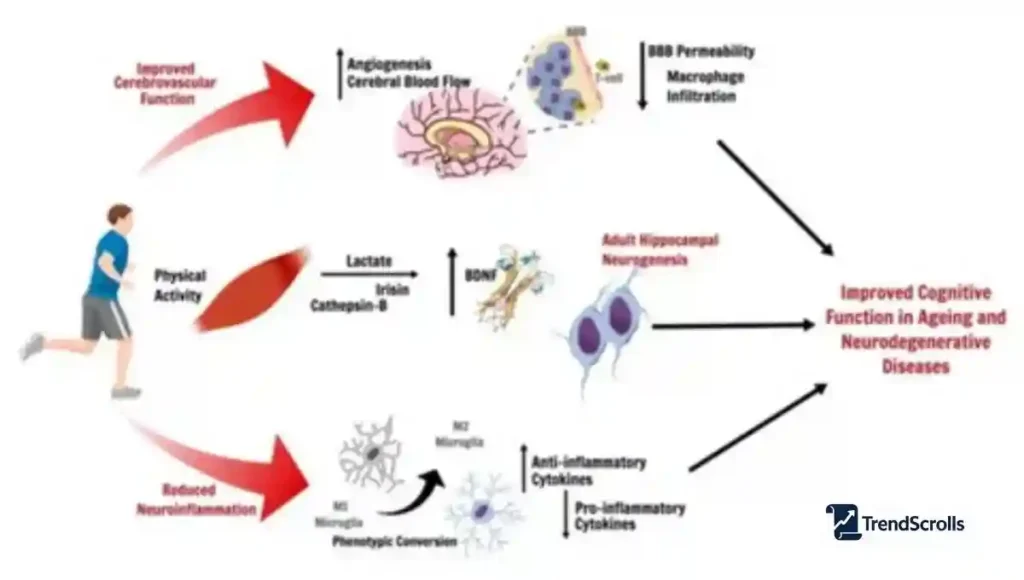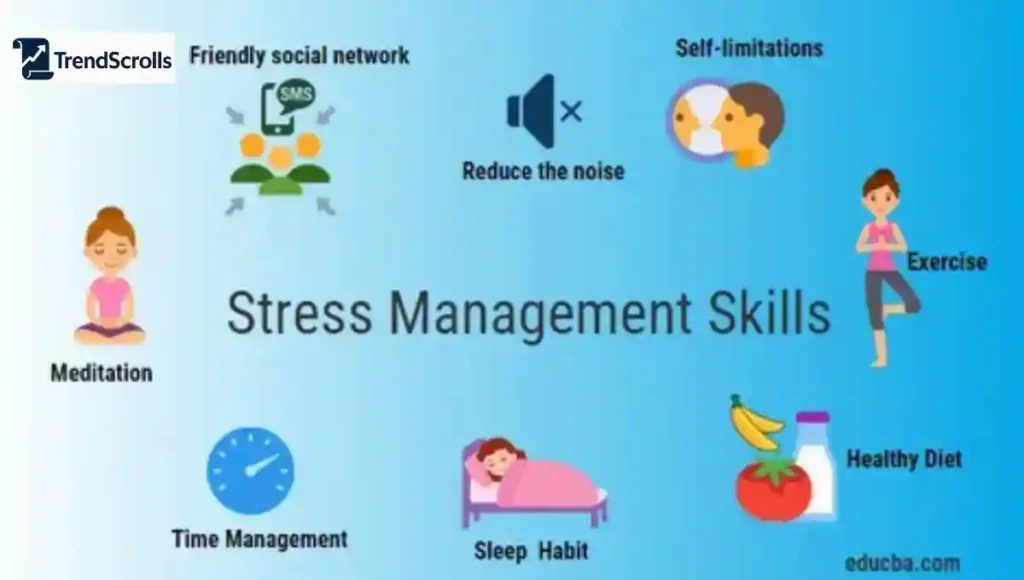In today’s fast-paced world, stress can accumulate quickly and quietly erode your peace. Whether it’s work, relationships, or daily pressures, many people in the USA are searching for 25 Quick Ways to Reduce Stress & Improve Mental Wellness that work. This guide provides quick stress relievers that require minimal time and money.
You’ll learn natural ways to relieve stress, how to use deep breathing exercises, and which stress-relieving foods to eat for a calmer mind. You’ll also discover easy calming exercises that soothe both your brain and body. Let’s explore practical tools that help you feel better fast, starting today.
Understanding the Root Causes of Stress
Stress doesn’t always come from obvious places. Sometimes it’s physical, like being sleep-deprived or running on caffeine. Other times it’s emotional, such as dealing with conflict or worry. Then there’s situational stress, triggered by things like deadlines, traffic, or daily chaos. Each kind of stress sets off your body’s fight-or-flight mode.
Once activated, your body releases cortisol and adrenaline, speeding up your heart and tightening your muscles. That’s why learning effective stress relief techniques early can stop the damage before it snowballs. Understanding your stressors is the first step in regaining control.
The Science Behind Stress & Your Body

Your body’s response to stress is complex. The hormone cortisol plays a major role. When it’s too high for too long, it can weaken your immune system, disturb sleep, and affect memory and mood. Chronic stress even changes how your brain functions over time.
That’s why adopting coping strategies for stress, like exercise, sleep, and nutrition, helps balance these hormones. Small adjustments each day can reduce cortisol levels and help your brain and body stay in sync.
Recognizing Early Signs of Stress Overload
Not everyone experiences stress the same way. Some may feel angry or impatient. Others may become anxious, foggy, or constantly tired. Headaches, stomach issues, or emotional outbursts are also red flags.
Catching these signs early allows you to use simple hacks for stress before things escalate. Awareness is a key skill when working to manage emotional burnout and protect your health long-term.
Physical Activity: Your First Line of Stress Defense
Movement is a natural mood booster. Just 10 minutes of walking or dancing triggers the release of feel-good chemicals called endorphins. It’s one of the fastest and most effective stress-reducing activities out there.
Even light motion—stretching, stepping outside, or cleaning—can help. These calming exercises also act as quick mood boosters, especially when done daily.
Table: Exercise & Mood Benefits
| Activity | Benefit |
| Walking | Boosts mood, clears thoughts |
| Stretching | Relieves muscle tightness |
| Dancing | Energizes and uplifts mood |
| Yoga | Relieves anxiety naturally, sharpens focus |
The Role of Nutrition in Stress Reduction

Food is fuel for your brain. Stress-relieving foods like berries, leafy greens, and salmon support mental clarity and stability. They help reduce internal inflammation and support emotional balance.
Avoid processed foods and sugary snacks, which spike and then crash your energy. Smart eating is one of the most effective and natural ways to relieve stress long-term. Hydration also matters—drink water to keep your mind sharp.
Create Healthy Sleep Habits for a Calm Mind
Sleep is the foundation of mental strength. Skipping rest increases irritability and makes it hard to concentrate. A solid bedtime routine helps prepare your brain to switch off.
Turn off screens, lower the lights, and use deep breathing exercises before bed. These habits help you reset your nervous system and drift off more easily.
Cut Down on Caffeine and Sugar for Mental Clarity
Caffeine may keep you awake, but it also raises your stress levels. Add sugar to the mix, and it becomes a recipe for anxiety. Instead, drink herbal teas or infused water to stay energized without the crash.
This small change can boost mental clarity and help you stay calm under pressure without artificial highs and lows.
Say Yes to Self-Care & Learn to Say No
Many people feel guilty for resting. But self-care for mental wellness is vital, especially when life feels demanding. It’s okay to step back and recharge.
Doing things you enjoy and protecting your time helps you manage emotional burnout and avoid resentment. Say no when you need to—you matter too.
Mindfulness & Meditation Made Simple

You don’t have to sit cross-legged for an hour to feel calm. Just five minutes of silence, focusing on your breath, counts as a powerful mindfulness practice.
Guided sessions through apps can teach you meditation for stress. These moments of stillness help you soothe anxious thoughts and bring presence to your day.
Journal Your Thoughts to Declutter Your Mind
Your mind feels lighter when your thoughts are on paper. Writing helps you process emotions and notice patterns. That’s why journaling for mental health is so popular.
Jotting down your worries makes them feel more manageable. It’s a private way to ease tension quickly and gain perspective.
Connect with Others & Strengthen Support Networks
Stress shrinks when it’s shared. Whether through a phone call, text, or face-to-face talk, human connection supports emotional health. You don’t have to do it all alone.
Strong friendships, family bonds, and support groups are powerful tools to relieve anxiety naturally. They remind you that you’re seen, heard, and loved.
Reap the Benefits of Yoga and Stretching
Gentle movement is healing. Yoga for anxiety relaxes your muscles and slows your thoughts. Even a few poses like child’s pose or legs-up-the-wall can make a difference.
Stretching keeps your body flexible and reduces stress hormones. It’s one of the most effective relaxation methods available to everyone.
Laugh, Cuddle & Get Creative: Unexpected Stress Busters
Laughter isn’t just fun—it changes your brain chemistry. A funny show or silly video can uplift your day fast. Listening to calming songs is also a form of music therapy for stress.
Physical affection works too. The benefits of cuddling pets include lowered blood pressure and emotional comfort. Creating something with your hands—art, music, or writing—also brings joy.
Spend Time in Nature to Recharge Naturally

Nature is a natural antidepressant. Just stepping outside for fresh air can lift your mood. Spending time in nature reduces cortisol, clears the mind, and improves overall happiness.
Try gardening, sitting by a tree, or walking a trail. These are simple yet powerful ways to calm down fast and reset mentally.
Consider Supplements (With Medical Guidance)
Some people benefit from supplements like magnesium, vitamin D, and ashwagandha. These support nervous system function but should be used responsibly.
Before trying any pills, speak to a doctor. These are tools to enhance, not replace, lifestyle changes that support self-soothing techniques.
When to Seek Professional Help for Stress
Sometimes, stress is too big to manage alone. If you’re feeling stuck, lost, or hopeless, it’s time to talk to a professional. A therapist can provide personalized guidance and help you learn what helps with stress fast.
Seeking help isn’t weakness—it’s wisdom. Therapy and mental health care are smart ways to overcome daily stress.
Top Tools, Apps & Resources to Manage Daily Stress
There are excellent tools designed to make stress management easier. From guided meditation to task tracking, these resources support every step of your journey.
| Tool | Type | Purpose |
| Calm | App | Sleep stories, breathing to relax |
| Headspace | App | Guided meditation and focus |
| Day One | App | Journaling for mental health |
| Todoist | App | Organizing tasks and routines |
Final Thoughts: Take Small Steps, See Big Changes
You don’t need to fix everything in a day. Just pick one strategy—maybe five-minute stress relief—and give it a try. Tomorrow, add another.
By making these easy changes, you’ll soon notice you can find instant calm, handle more stress, and enjoy your life with a lighter heart. Keep going—you’ve got this.
FAQS
-
What are the quickest ways to relieve stress during work?
Take a 5-minute walk, try deep breathing exercises, or listen to calming music. -
Can food help reduce stress?
Yes, eating stress-relieving foods like berries and nuts helps lower cortisol naturally. -
Is meditation effective for instant stress relief?
Absolutely. Meditation for stress can calm your mind in just minutes. -
What causes sudden stress in daily life?
Work pressure, money worries, or relationship tension often trigger quick stress spikes. -
How can I calm my nerves before a big event?
Use breathing to relax, stretch, or write down your thoughts. -
Do stress apps help?
Yes, apps like Calm or Headspace offer quick mood boosters and guided support. -
Are there stress relief techniques that don’t need equipment?
Yes, try mindfulness practice, journaling, or progressive muscle relaxation. -
How does journaling help reduce stress?
It clears your mind and organizes your emotions, aiding mental wellness. -
Can yoga reduce anxiety and tension?
Definitely. Yoga for anxiety improves both mental clarity and body relaxation. -
Is spending time in nature proven to reduce stress?
Yes, spending time in nature lowers blood pressure and boosts happiness. -
What are good nighttime stress relief habits?
Read a book, use relaxation methods, or listen to soft music before bed. -
Should I limit caffeine to manage stress?
Yes, cutting caffeine boosts focus and helps you stay calm under pressure. -
Are supplements good for relieving anxiety?
Some, like magnesium, help, but always consult your doctor first. -
What’s the best 5-minute stress fix?
Five-minute stress relief methods include stretching, breathing, and fresh air. -
When should I see a professional for stress?
If you feel stuck or overwhelmed daily, it’s time to seek help.



